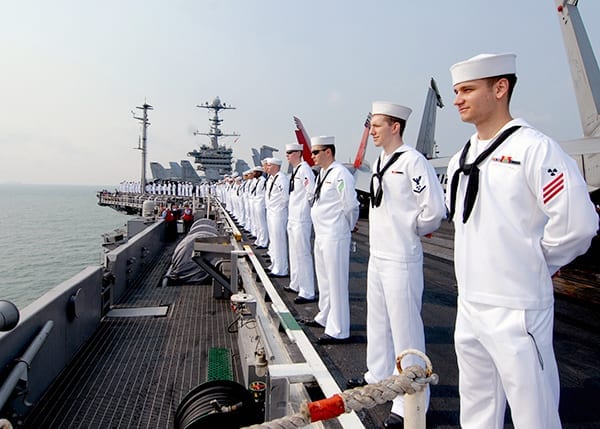
Updated Jun 2023
Military Strength More Important
In a gripping interview with Fox News host Sean Hannity, former President Trump shattered the traditional paradigms of politics and economics, boldly declaring his unwavering commitment to prioritize military strength over a balanced federal budget. His resounding statement echoed with the conviction that sometimes, unconventional choices are necessary to ignite economic prosperity and safeguard the nation.
“A balanced budget is fine,” Trump remarked, his voice steady and resolute. “But sometimes you have to fuel the well in order to really get the economy going. And we have to take care of our military. Our military is more important to me than a balanced budget. Because we’ll get there with a balanced budget.”
As the nation leaned in to hear the former president’s perspective, it became apparent that Trump’s vision extended far beyond mere fiscal responsibility. His words, brimming with determination, struck at the heart of a timeless debate: fiscal restraint versus military might. He acknowledged the value of a balanced budget but underscored that for him, fortifying the country’s defense was paramount, a cornerstone of his strategic approach.
“I want a balanced budget eventually,” he added, his tone exuding a sense of anticipation. “But I want to have a strong military. To me, that’s much more important than anything.”
As President Trump’s unwavering commitment to military strength reverberated through the nation, it wasn’t long before prominent figures in the political arena voiced their concerns. One of the most influential voices to emerge was that of Senator John McCain, a respected Republican hailing from the arid landscapes of Arizona. Senator McCain’s apprehension centered on President Trump’s choice to lead the Office of Management and Budget, Representative Mick Mulvaney, a fiscal conservative with a reputation for advocating substantial federal spending cuts.
McCain, a stalwart supporter of a robust military, found himself in a profound ideological conflict with Mulvaney’s approach. He understood that while fiscal discipline was essential, it should never come at the cost of national defense. The military, in McCain’s view, was the guardian of the nation’s security, the shield that protected the homeland from the unpredictable winds of global affairs.
The clash between these two political titans encapsulated the broader struggle within the political landscape—a struggle that extended far beyond the boundaries of the Beltway. It was a struggle for the very soul of the nation’s priorities, a contest of values and visions that would impact every American citizen.
McCain’s apprehensions mirrored those of many who felt that drastic cuts to federal spending could potentially imperil the military’s funding. These concerns weren’t mere abstract notions; they had tangible implications for the men and women in uniform, the security of the nation, and its ability to respond to emerging global challenges.
In an era marked by global instability, unforeseen threats, and ever-evolving technologies, the question of military strength wasn’t just a matter of political rhetoric; it was a pressing reality. How the nation allocated its resources, and whether it chose to prioritize military strength, had a direct bearing on its resilience in the face of an uncertain future.
Thus, Senator McCain’s apprehensions, while expressing a momentary discord in the political arena, also underscored the profound responsibility that comes with governing a nation. It was a reminder that in the pursuit of fiscal responsibility, the core essence of a nation’s defense should remain inviolable, resolute, and undiminished. The debate over military strength transcended party lines, offering a vivid insight into the intricate tapestry of American governance.
Mick Mulvaney, a prominent figure in fiscal conservatism and the President’s pick to lead the Office of Management and Budget, found himself at the center of this fiery debate. His reputation as a staunch advocate for stringent budgetary reductions had earned him respect in fiscal conservative circles. However, this reputation also served as a harbinger of conflict with President Trump’s steadfast dedication to military strength, which had taken center stage in the nation’s discourse.
Mulvaney’s fiscal conservatism ran deep, his philosophy rooted in the belief that substantial federal spending cuts were not only prudent but essential for sustainable economic growth. He had made no secret of his opposition to increasing military funding in the past. For him, the military’s budget, like any other line item in the federal ledger, was subject to scrutiny and belt-tightening.
As the ideological collision between Trump’s resolute commitment to military strength and Mulvaney’s unwavering stance on fiscal restraint played out in the public eye, it laid bare the profound implications of Trump’s declaration. This clash of principles wasn’t merely a political squabble; it was a visceral representation of the overarching debate on how a nation should allocate its resources.
The essence of the conflict was simple yet profound. On one side stood Trump, resolute in his belief that military strength was the cornerstone of national security, an insurance policy that could not be compromised. On the other side was Mulvaney, a proponent of fiscal responsibility, who believed that strict budgetary reductions were paramount for long-term economic well-being.
This ideological tug-of-war encapsulated the essence of governance and the inherent dilemmas faced by policymakers. It was a quintessential example of the choices leaders must make when confronted with conflicting priorities. Should fiscal responsibility take precedence over military might? Or should a nation allocate its resources in such a way that security remains paramount, even if it means straying from the path of fiscal discipline?
As the debate raged on, it became clear that the clash between these two perspectives was far from a mere political skirmish. It was an exploration of the soul of the nation’s governance, a contemplation of the delicate equilibrium between fiscal restraint and military preparedness, and a reflection of the nation’s values and vision for the future.
As we venture into the complex realm of American politics, it’s clear that the interplay between fiscal discipline and military might takes center stage. The former President’s assertion serves as a striking reminder that the choices made at the highest echelons of power have profound consequences on the nation’s trajectory.
Intriguing and unprecedented, Trump’s prioritization of military strength over a balanced budget not only defies convention but opens up a riveting dialogue on the evolving dynamics of governance, and the unwavering commitment to safeguarding the country’s security in an ever-changing world.
Indeed, as we delve deeper into the intricacies of this paradigm shift, it becomes evident that the phrase “Military Strength” is more than just a set of words; it is the embodiment of a resolute vision, an enduring commitment, and an essential pillar upon which a nation’s fate is built. The quest for military strength is a relentless pursuit of security, preparedness, and the indomitable spirit that stands guard against the ever-unpredictable tides of history.
Other articles of interest
Dow Jones Industrial Average Stocks Soar Slaughtering the Bears
Gold buying Spree Russia & Russian Strength?

China’s corruption crackdown targets both big & small officials
China Corruption: Fast & Furious crackdown
The Big Picture: Lower oil & energy prices
Crude oil price projections: will oil prices stabilize
The Middle Class Squeeze: 4.00 in 1973 equates to 22.41 today
Syria War News: It Is All About Blood, Guns & Money
For Many Americans Great Recession Never Ended
Is VIX pointing to a stock market crash in 2016?
Belt & Road Initiative: Taking China’s culture beyond borders
EU stands to benefit by Granting China free market status
China cuts rates to boost green energy demand



